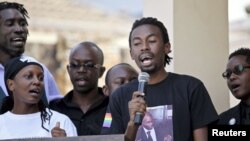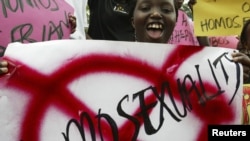LONDON —
The arrest in Uganda of British theatre producer David Cecil, who staged a play about a gay man despite a ban by the country's media authorities, has raised questions about the influence of some Western Christian groups in Africa. Analysts say this influence has had a part to play in a number of African governments cracking down on gay rights.
Released on bail Monday, after being arrested two weeks ago over a play about a gay businessman who was killed by his staff, David Cecil’s case highlights the recent homophobic activity across Africa.
“On the one hand there is a noticeable increase of homophobia on the continent but that's also a reflection of the growing strength of the LGBT movement,” said Graeme Reid, the Director of the Lesbian, Gay, Bisexual, and Transgender (LGBT) Rights Program at Human Rights Watch.
Phil Clarke, a lecturer in comparative politics at the School of Oriental and African Studies, says the main reasons behind this apparent increase in anti-gay activity are religious lobbying and African governments’ desire to express self-determination.
“I think the reason we're seeing crackdowns in some countries is that firstly politicians are reacting to very powerful religious lobby groups that they need to curry favor with and there's also, I think, a sense that this is one way in which African governments can express some degree of self-determination and difference from western interference,” he said.
According to a report released earlier this year by the progressive group Political Research Associates, or PRA, Western Christian groups such as Human Life International, Family Watch International and the American Center for Law and Justice have been building up influence across the region.
Clarke says much of this funding is promoting homophobia.
“We've seen, especially in Uganda and Kenya, the very powerful influence of Western churches which have poured a great deal of funding into these anti-homosexuality campaigns in Africa," he said. "So an anti-homosexuality stance has become very lucrative for many Ugandan and Kenyan parishes. Those churches on the ground in Africa have often made homosexuality a bigger political deal than they may have in the past.”
Kapya Kaoma, a Zambian Anglican priest and researcher for the group, says African homophobia is being encouraged by American conservatives.
“The growth of the evangelical or Pentecostal movement across sub-Saharan Africa has also brought about the growth in homophobia because of the teachings which have been promoted by the conservatives in America across Africa," said Kaoma.
The Catholic group Human Life International disputes these claims. According to the PRA report, the group has been involved in drafting amendments and constitutions in Zambia and Kenya, as well as working against the decriminalization of abortions in the Congo and the Democratic Republic of Congo.
Stephen Phelan, a spokesman for the Catholic group, says the group’s message on sexuality agrees with African values.
“The term homophobia is itself a Western import," he said. "We're the ones who tend to speak very naturally to African values so there's little conflict in what we have to say. We just want to reaffirm them and let them know that the culture wars that we're having in the west are sadly coming to Africa, being imposed not by Africans a lot of the time but by western governments who are much better funded than the small Christian and Catholic organizations like ourselves.”
Despite speeches and statements made by a few Western countries and groups threatening to withdraw aid unless African governments recognize gay rights, Clarke says that Western leaders aren’t likely to act on their threats because they have other priorities in the region.
“I wonder how much this is talk from international donors as opposed to action," he said. "I haven't seen a case yet where this has actually translated into a deliberate cut of international aid. I think because the countries in Africa where we're seeing these anti-homosexuality laws become an issue are also countries that are considered to have been very successful in how they've used international aid and so issues of anti-homosexuality laws simply aren't big enough to change the policies of major donors. They have other incentives for being involved in these countries.”
Meanwhile the charges against producer David Cecil in Uganda are still in place as the movement for Lesbian, Gay, Bisexual and Transgender rights comes up against traditional African religious beliefs and the influence of several large Western conservative religious organizations.
Released on bail Monday, after being arrested two weeks ago over a play about a gay businessman who was killed by his staff, David Cecil’s case highlights the recent homophobic activity across Africa.
“On the one hand there is a noticeable increase of homophobia on the continent but that's also a reflection of the growing strength of the LGBT movement,” said Graeme Reid, the Director of the Lesbian, Gay, Bisexual, and Transgender (LGBT) Rights Program at Human Rights Watch.
Phil Clarke, a lecturer in comparative politics at the School of Oriental and African Studies, says the main reasons behind this apparent increase in anti-gay activity are religious lobbying and African governments’ desire to express self-determination.
“I think the reason we're seeing crackdowns in some countries is that firstly politicians are reacting to very powerful religious lobby groups that they need to curry favor with and there's also, I think, a sense that this is one way in which African governments can express some degree of self-determination and difference from western interference,” he said.
According to a report released earlier this year by the progressive group Political Research Associates, or PRA, Western Christian groups such as Human Life International, Family Watch International and the American Center for Law and Justice have been building up influence across the region.
Clarke says much of this funding is promoting homophobia.
“We've seen, especially in Uganda and Kenya, the very powerful influence of Western churches which have poured a great deal of funding into these anti-homosexuality campaigns in Africa," he said. "So an anti-homosexuality stance has become very lucrative for many Ugandan and Kenyan parishes. Those churches on the ground in Africa have often made homosexuality a bigger political deal than they may have in the past.”
Kapya Kaoma, a Zambian Anglican priest and researcher for the group, says African homophobia is being encouraged by American conservatives.
“The growth of the evangelical or Pentecostal movement across sub-Saharan Africa has also brought about the growth in homophobia because of the teachings which have been promoted by the conservatives in America across Africa," said Kaoma.
The Catholic group Human Life International disputes these claims. According to the PRA report, the group has been involved in drafting amendments and constitutions in Zambia and Kenya, as well as working against the decriminalization of abortions in the Congo and the Democratic Republic of Congo.
Stephen Phelan, a spokesman for the Catholic group, says the group’s message on sexuality agrees with African values.
“The term homophobia is itself a Western import," he said. "We're the ones who tend to speak very naturally to African values so there's little conflict in what we have to say. We just want to reaffirm them and let them know that the culture wars that we're having in the west are sadly coming to Africa, being imposed not by Africans a lot of the time but by western governments who are much better funded than the small Christian and Catholic organizations like ourselves.”
Despite speeches and statements made by a few Western countries and groups threatening to withdraw aid unless African governments recognize gay rights, Clarke says that Western leaders aren’t likely to act on their threats because they have other priorities in the region.
“I wonder how much this is talk from international donors as opposed to action," he said. "I haven't seen a case yet where this has actually translated into a deliberate cut of international aid. I think because the countries in Africa where we're seeing these anti-homosexuality laws become an issue are also countries that are considered to have been very successful in how they've used international aid and so issues of anti-homosexuality laws simply aren't big enough to change the policies of major donors. They have other incentives for being involved in these countries.”
Meanwhile the charges against producer David Cecil in Uganda are still in place as the movement for Lesbian, Gay, Bisexual and Transgender rights comes up against traditional African religious beliefs and the influence of several large Western conservative religious organizations.





